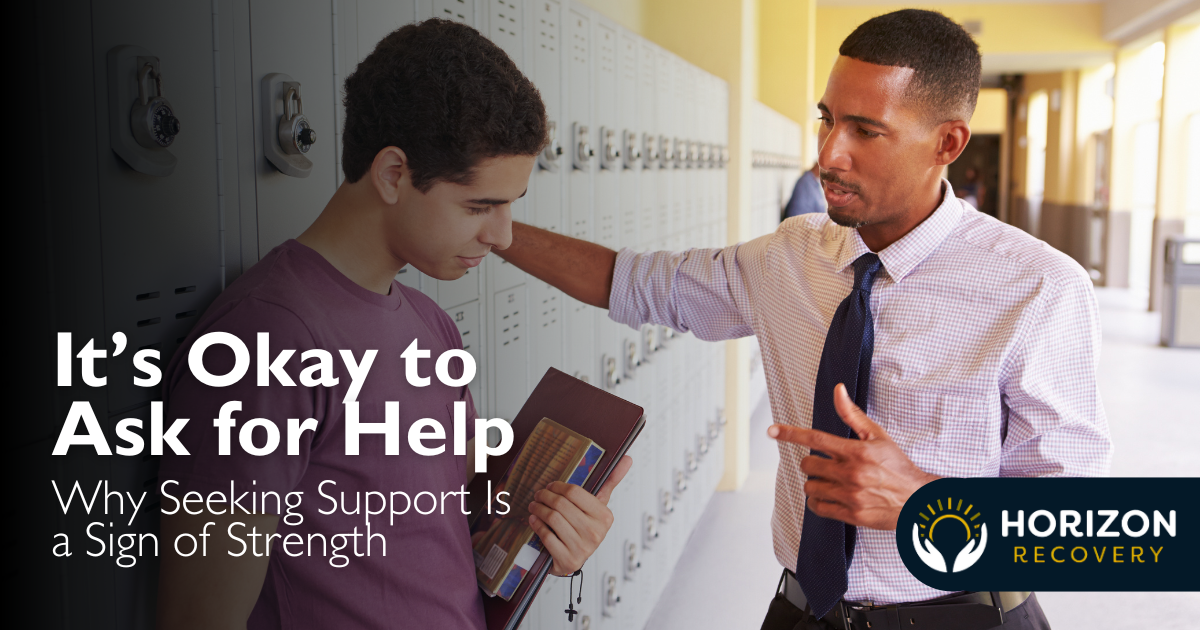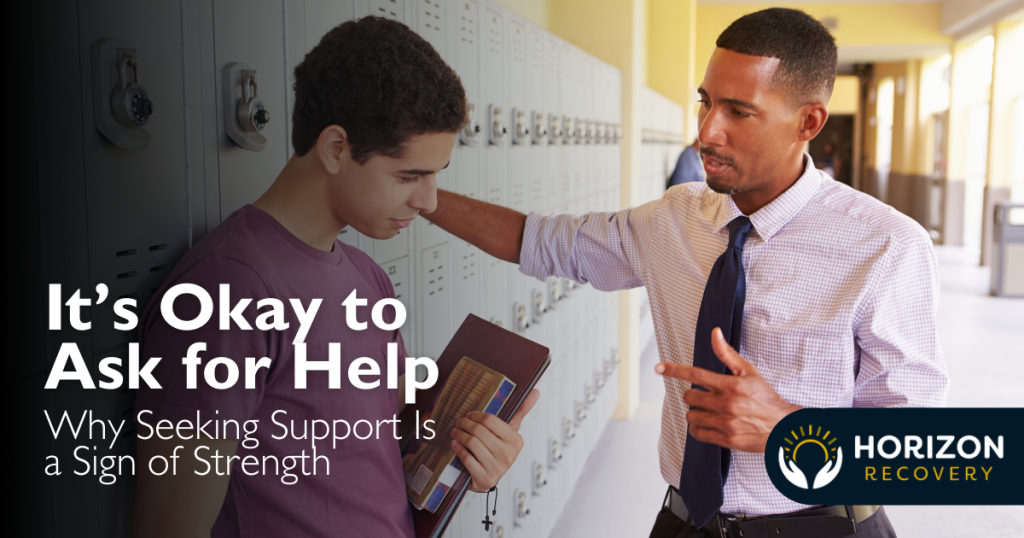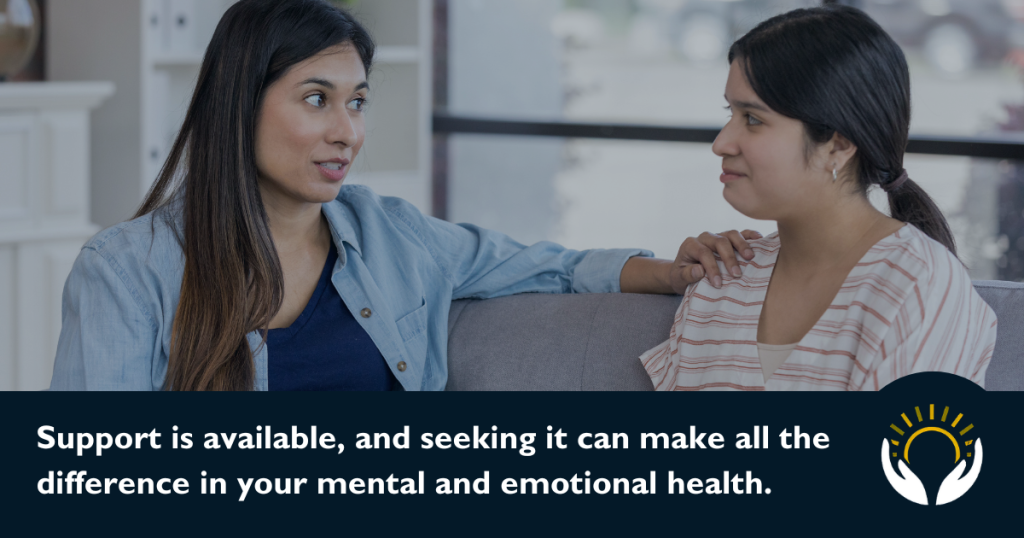
It’s Okay to Ask for Help: Why Seeking Support Is a Sign of Strength

Why Asking for Help Is Important
There is a common misconception that asking for help is a sign of weakness. Many people are taught to “handle it on their own” or “tough it out,” but this belief can prevent individuals from seeking support when they need it most.
In reality, recognizing when you need help is a sign of self-awareness and courage. No one is meant to go through life’s challenges alone. For teenagers, school pressures, friendships, family dynamics, and personal struggles can feel overwhelming. When these feelings become unmanageable, it’s important to know that help is available and that reaching out is a sign of strength—not failure.
Executive Perspectives: Why Asking for Help Shows Strength
Brian Carlisle, RN, FNP-C, MSLE
Administrator | Horizon Recovery
“In my 15 years responding to adolescent mental health crises, I’ve witnessed a surprising pattern: the strongest teens aren’t those who suffer silently—they’re the ones brave enough to ask for help. At Horizon Recovery, we’ve built a space where this counterintuitive truth can flourish: reaching out isn’t surrendering to weakness, it’s taking the first powerful step toward authentic resilience.”
Patrick Buehl
Executive Director | Horizon Recovery
“Who told you handling everything alone makes you strong? They were wrong. Through my own mental health journey, I discovered that real strength emerges through connection, not isolation. When teens seek support early, they develop coping skills that serve them for life. At Horizon, we’re proving daily that vulnerability isn’t weakness—it’s the foundation of authentic strength.”

How Do I Ask a Teacher for Help with Mental Health?
Many students feel unsure about discussing mental health concerns with teachers. However, teachers are there to support students beyond academics and can help connect them with useful resources.
Steps to Ask a Teacher for Help:
- Choose the Right Time: Find a quiet moment before or after class when your teacher is not busy.
- Be Honest and Direct: You can say, “I’ve been feeling overwhelmed and struggling with my mental health. Could you help me find some resources or someone to talk to?”
- Ask for Guidance: Many teachers can direct students to school counselors, mental health resources, or crisis support.
For additional advice, check out this guide on talking to teachers about mental health from Anxiety in the Classroom, a collaboration with the International OCD Foundation.
How to Talk to a Parent About Feeling Overwhelmed as a Teenager
Opening up to a parent about mental health can feel intimidating, especially if you’re worried they won’t understand. However, many parents want to support their children but may not know how.
How to Approach the Conversation:
- Pick a Good Time to Talk: Find a private, relaxed moment when neither of you are distracted.
- Use “I” Statements: For example, “I’ve been feeling really stressed out lately because of school and my social life.”
- Explain What You Need: Whether it’s guidance, emotional support, or professional help, let them know what you’re looking for.
- Be Patient: Parents may need time to fully understand your experience. Keeping the conversation open allows them to learn more.
For additional support, visit NAMI’s guide on talking to parents about mental health from the National Alliance on Mental Illness (NAMI).
What Teens Should Say When Asking for Therapy
Seeking therapy is a proactive step toward emotional health, yet many teens hesitate because they don’t know how to ask for it.
How to Talk About Therapy:
- Be Clear About Why You Want Therapy: You can say, “I’ve been feeling really anxious lately, and I think therapy could help me work through these feelings.”
- Ask for Help Finding a Therapist: A school counselor, teacher, or parent may have recommendations.
- Reinforce That Therapy Is Not a Sign of Weakness: Therapy provides a safe space to understand your emotions and develop coping skills.
Learn more about how therapy can help teenagers from the American Psychological Association (APA).
How to Ask for Help When You Don’t Know Where to Start
If you’re feeling overwhelmed and don’t know where to begin, you’re not alone. Mental health struggles can feel isolating, but there are steps to take even if you’re unsure where to turn.
Where to Start:
- Acknowledge Your Feelings: Recognizing that you’re struggling is the first step toward healing.
- Talk to Someone You Trust: A parent, friend, teacher, or school counselor can be a good starting point.
- Take Small Steps: If you’re unsure where to go, a school counselor or therapist can guide you.
For more information on teen mental health challenges, visit NIMH’s guide to adolescent mental health from the National Institute of Mental Health (NIMH).
Is It Okay to Ask a Friend for Emotional Support?
It’s natural to turn to friends during difficult times. Friends can provide comfort, but it’s important to maintain a balance and recognize that they may not always have the tools to help with deeper issues.
How to Ask for Support from a Friend:
- Be Honest About Your Feelings: Let your friend know what you’re going through.
- Respect Boundaries: Friends can offer support, but they shouldn’t replace professional help when needed.
- Show Appreciation: Emotional conversations can be difficult for both parties. Express gratitude and check in on them, too.
For tips on setting boundaries and seeking support, check out this mental health conversation guide from IDONTMIND, a mental health awareness initiative.

It’s Okay to Ask for Help
Asking for help is a courageous and empowering decision. Whether you’re seeking support from a teacher, parent, friend, or therapist, know that you are not alone.
At Horizon Recovery, we understand the challenges teens face and are here to provide professional, compassionate care. If you or someone you know is struggling with mental health, don’t hesitate to reach out for support.
Reviewed By: Trusted Teen Mental Health Specialists
This article has been reviewed by experienced professionals in adolescent mental health treatment to ensure accuracy, clinical relevance, and compassionate care.
Brian Carlisle, RN, FNP-C, MSLE
Administrator | Horizon Recovery
Brian Carlisle brings over 15 years of experience as a Phoenix Fire Department Captain/Paramedic, specializing in emergency adolescent mental health crises. As a Family Nurse Practitioner (FNP-C) and Administrator of Horizon Recovery, he integrates medical expertise with a deep understanding of crisis intervention. His Master’s in Business Leadership and Ethics helps shape evidence-based treatment programs that prioritize both clinical excellence and compassionate care. His firsthand experience with mental health struggles among first responders fuels his mission to create supportive, transformative environments for teens and their families.
Patrick Buehl
Executive Director | Horizon Recovery
With over 30 specialized certifications in behavioral health, Patrick Buehl serves as Executive Director of Horizon Recovery, overseeing comprehensive adolescent treatment programs. His personal journey through mental health challenges informs his empathetic leadership approach, ensuring that every treatment plan is rooted in evidence-based therapeutic practices. He remains actively engaged with clients, families, and staff, working closely with clinical experts to deliver holistic, individualized care that supports long-term recovery and well-being for teens.
Parent Testimonial:
Katie Burrell:
“Amazing and caring staff. My son has been under their care for over two months and from Alexis to Stephanie, Loy to Cheyenne, Lacey and beyond, everyone has been so loving and nurturing. As a parent, it’s scary to hand over a child, let alone a vulnerable one, but it’s as if I left him with family.”
“I get updates frequently and can see and tell that he’s comfortable and feels safe. I recommend this place hands down.”
More posts like this
.svg)
Guiding your teen’s path to mental clarity, sobriety, and a hopeful future.
For more information or to schedule a visit, please reach out to us today. Our empathetic and caring team is here to support you every step of the way.
.svg)
.avif)
.svg)
.svg)



